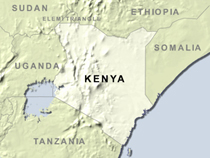2006年VOA标准英语-Kenyans Top List of Child Sex Clients at Kenya'
时间:2019-01-11 作者:英语课 分类:2006年VOA标准英语(十二月)
By Cathy Majtenyi
Nairobi
19 December 2006
A study released Tuesday by the U.N. children's agency and the Kenyan government says Kenyans top the list of tourists who sexually exploit and abuse children 18 years of age and under at Kenya's coast. Meanwhile, three-quarters of the coastal 1 communities surveyed say that sex tourism of children is normal or beneficial to the communities. Cathy Majtenyi reports for VOA from Nairobi.

Roughly 41percent of adults who pay children as young as 12-years-old for sex at Kenya's coast are Kenyans.
Most of the remaining 59 percent of sex tourism clients are Italians, Germans, and Swiss.
At the launch of the study, titled "The Extent and Effect of Sex Tourism and Sexual Exploitation of Children on the Kenyan Coast," Kenyan vice 2 president Moody 3 Awori expressed his outrage 4 at what he calls a moral decay and degeneration.
"This is totally foreign to the African tradition," he said. "Families respected their children. Nobody could imagine that a child, particularly a girl, under the age of 18 would know much or anything about sexual activities. When we say that 41 percent of the abusers are Kenyans, then we really should condemn 5 ourselves. When it came out that some parents at the coast were proud that the children had a foreign "friend," a friend that was putting food on the table, that shocked me."
The study, conducted by UNICEF and the Kenyan government, incorporates the results of diaries that the children themselves kept of their sexual activities and clients, along with surveillance of so-called "hot spots" such as bars and beaches, and interviews with communities in the coastal districts of Malindi, Kilifi, Mombasa, and Kwale.
Up to about 15,000 girls between the ages of 12 to 18 are estimated to be involved in sex tourism in the study areas.
As many as 45 percent of children engaged in sex work with tourists are from eastern, central, and western provinces. Of the child sex workers from resort areas, 40 percent had lost one or both of their parents.
The study's author, Sarah Jones, says one of the most disturbing findings, besides the prominence 6 of Kenyan clients, is that more than 75 percent of those surveyed, including parents, students, government staff, and community leaders, either accepted the practice of child sex tourism as being normal or even approved of it.
Jones says pockets of extreme poverty and food insecurity in the areas often push the children to take great risks of contracting HIV/AIDS, especially when clients do not use condoms.
"There was a child who had a number of tourist clients, and she died," said Ms. Jones. "Her peers were ready to take over her clients absolutely in the knowledge that their risk was immense. Adult sex workers won't take the same level of risk. They [children] will play Russian Roulette with their clients, and they are paid more to play Russian Roulette."
Jones says that children who engage in regular sex are paid about $28, but the payment shoots up to between $72 to $14 for anal and other high-risk sex.
If they were to engage in more traditional labor 7, the children would earn between one and two dollars a day.
Sexual offenses 8 against children technically 9 are covered under Kenya's Children Act, approved in 2001, but childcare workers say that the law is seldom enforced.
- The ocean waves are slowly eating away the coastal rocks.大海的波浪慢慢地侵蚀着岸边的岩石。
- This country will fortify the coastal areas.该国将加强沿海地区的防御。
- He guarded himself against vice.他避免染上坏习惯。
- They are sunk in the depth of vice.他们堕入了罪恶的深渊。
- He relapsed into a moody silence.他又重新陷于忧郁的沉默中。
- I'd never marry that girl.She's so moody.我决不会和那女孩结婚的。她太易怒了。
- When he heard the news he reacted with a sense of outrage.他得悉此事时义愤填膺。
- We should never forget the outrage committed by the Japanese invaders.我们永远都不应该忘记日本侵略者犯下的暴行。
- Some praise him,whereas others condemn him.有些人赞扬他,而有些人谴责他。
- We mustn't condemn him on mere suppositions.我们不可全凭臆测来指责他。
- He came to prominence during the World Cup in Italy.他在意大利的世界杯赛中声名鹊起。
- This young fashion designer is rising to prominence.这位年轻的时装设计师的声望越来越高。
- We are never late in satisfying him for his labor.我们从不延误付给他劳动报酬。
- He was completely spent after two weeks of hard labor.艰苦劳动两周后,他已经疲惫不堪了。
- It's wrong of you to take the child to task for such trifling offenses. 因这类小毛病责备那孩子是你的不对。 来自《简明英汉词典》
- Thus, Congress cannot remove an executive official except for impeachable offenses. 因此,除非有可弹劾的行为,否则国会不能罢免行政官员。 来自英汉非文学 - 行政法
- Technically it is the most advanced equipment ever.从技术上说,这是最先进的设备。
- The tomato is technically a fruit,although it is eaten as a vegetable.严格地说,西红柿是一种水果,尽管它是当作蔬菜吃的。